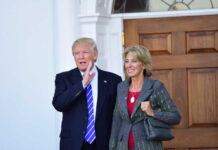
The Biden administration announced plans to restrict common appliances that use traditional fuels, months after denials that it would limit access to stoves and furnaces.
In particular, the Department of Energy is pushing for restrictions on home furnaces unless they meet new energy efficiency levels. Under the current plan, the regulations would take effect in 2029.
The regulations were initially proposed last summer and are reportedly close to finalization. For many Americans, the new furnaces would require retrofitting for use.
The regulations are being contested by the American Gas Association (AGA).
The current estimate is that the Biden plan would bar up to 60% of current furnaces. The administration estimates that the changes could save Americans about $5 per month.
This is not the first step in the White House’s proposed changes regarding common household staples. Earlier this year, Department of Energy regulators moved to increase energy efficiency standards for gas-burning stoves
This would, in effect, ban more than 90% of existing gas stoves.
Department of Energy Secretary Jennifer Granholm said last year that the move was an effort to update “energy standards for many carbon-emitting appliances.”
Radicals who resent how you live your daily life are coming for your gas stove, your AC, your lawn mower, your plastic bags.
They want to force a lifestyle on you, and show contempt if you disagree. | @NoahCRothmanhttps://t.co/hzY3ZBEJBh pic.twitter.com/XL0cc0XBCO
— National Review (@NRO) June 8, 2023
The Department of Energy estimated that the more efficient units would save consumers approximately $1.50 in saved fuel costs per year.
Efforts by states such as New York and California to restrict gas stoves led to sharp denials from the White House and a number of media pieces denying such a plan at the federal level.
A Berkeley, California plan to ban natural gas hookups in new constructions was blocked by a federal court in April. The unanimous decision found that the ban was unconstitutional.
The state of New York barred natural gas connections for most new construction last month, taking effect in 2025, with some aspects being phased in through 2029.
Only electric hookups for utilities and appliances will be allowed.
The effort was criticized by the state’s Republican Party, which was unable to block it in the heavily-Democratic state.













